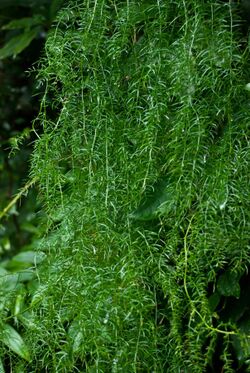Biology:Asparagus cochinchinensis
From HandWiki
Revision as of 01:14, 13 July 2021 by imported>Steve Marsio (fixing)
Short description: Species of flowering plant
| Asparagus cochinchinensis | |
|---|---|

| |
| Scientific classification | |
| Kingdom: | Plantae |
| Clade: | Tracheophytes |
| Clade: | Angiosperms |
| Clade: | Monocots |
| Order: | Asparagales |
| Family: | Asparagaceae |
| Subfamily: | Asparagoideae |
| Genus: | Asparagus |
| Species: | A. cochinchinensis
|
| Binomial name | |
| Asparagus cochinchinensis (Lour.) Merr.
| |
| Synonyms | |
|
List
| |
Asparagus cochinchinensis[1] is a species of plant, sometimes called "Chinese asparagus", in the subfamily Asparagoideae of the family Asparagaceae. No subspecies are listed in the Catalogue of Life.[2]
Range and description
Asparagus cochinchinensis is distributed in eastern Asia including the Philippines and Japan; named after the southern region of Vietnam, in Vietnamese A. cochinchinensis is called thiên môn đông,[3] the latter similar to tian men dong (天門冬) in Chinese. This is a trailing plant, growing up to 2.5 m long; leaves are phyllodes, 15-25 mm long. The flowers are axillary and the white berries are often in pairs.[3]
The roots and stems are used in traditional Chinese and Korean medicine.[4]
Gallery
References
- ↑ Merrill ED (1919) Philipp. J. Sci. 15: 230.
- ↑ Roskov Y., Kunze T., Orrell T., Abucay L., Paglinawan L., Culham A., Bailly N., Kirk P., Bourgoin T., Baillargeon G., Decock W., De Wever A., Didžiulis V. (ed) (2014). "Species 2000 & ITIS Catalogue of Life: 2014 Annual Checklist.". Species 2000: Reading, UK.. http://www.catalogueoflife.org/annual-checklist/2014/details/species/id/9757255. Retrieved 12 February 2020.
- ↑ 3.0 3.1 Phạm Hoàng Hộ (2003) Cây Cỏ Việt Nam: an Illustrated Flora of Vietnam vol. III (entry: 9629B) publ. Nhà Xuẩt Bản Trẻ, HCMC, VN.
- ↑ Lee DY, Choo BK, Yoon T, Cheon MS, Lee HW, Lee AY, Kim HK (2009). Anti-inflammatory effects of Asparagus cochinchinensis extract in acute and chronic cutaneous inflammation. Journal of Ethnopharmacology. 121 (1): 28–24. (PMID 18691647)
External links
Wikidata ☰ Q8207156 entry
 |



